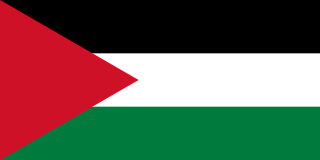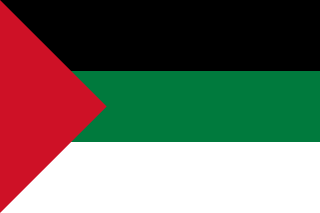Related Research Articles

The United Arab Republic was a sovereign state in the Middle East from 1958 until 1961. It was initially a political union between Egypt and Syria from 1958 until Syria seceded from the union following the 1961 Syrian coup d'état. Egypt continued to be known officially as the United Arab Republic until it was formally dissolved by Anwar Sadat in September 1971.

Gamal Abdel Nasser Hussein was an Egyptian military officer and politician who served as the second president of Egypt from 1954 until his death in 1970. Nasser led the Egyptian revolution of 1952 and introduced far-reaching land reforms the following year. Following a 1954 attempt on his life by a Muslim Brotherhood member, he cracked down on the organization, put President Mohamed Naguib under house arrest and assumed executive office. He was formally elected president in June 1956.

The Suez Crisis also known as the Second Arab–Israeli War, the Tripartite Aggression in the Arab world and as the Sinai War in Israel, was a British–French–Israeli invasion of Egypt in 1956. Israel invaded on 29 October, having done so with the primary objective of re-opening the Straits of Tiran and the Gulf of Aqaba as the recent tightening of the eight-year-long Egyptian blockade further prevented Israeli passage. After issuing a joint ultimatum for a ceasefire, the United Kingdom and France joined the Israelis on 5 November, seeking to depose Egyptian president Gamal Abdel Nasser and regain control of the Suez Canal, which Nasser had earlier nationalised by transferring administrative control from the foreign-owned Suez Canal Company to Egypt's new government-owned Suez Canal Authority. Shortly after the invasion began, the three countries came under heavy political pressure from both the United States and the Soviet Union, as well as from the United Nations, eventually prompting their withdrawal from Egypt. Israel's four-month-long occupation of the Egyptian-occupied Gaza Strip and Egypt's Sinai Peninsula enabled it to attain freedom of navigation through the Straits of Tiran, but the Suez Canal was closed from October 1956 to March 1957.
The Eisenhower Doctrine was a policy enunciated by Dwight D. Eisenhower on January 5, 1957, within a "Special Message to the Congress on the Situation in the Middle East". Under the Eisenhower Doctrine, a Middle Eastern country could request American economic assistance or aid from U.S. military forces if it was being threatened by armed aggression. Eisenhower singled out the Soviet threat in his doctrine by authorizing the commitment of U.S. forces "to secure and protect the territorial integrity and political independence of such nations, requesting such aid against overt armed aggression from any nation controlled by international communism." The phrase "international communism" made the doctrine much broader than simply responding to Soviet military action. A danger that could be linked to communists of any nation could conceivably invoke the doctrine.

Abdul Salam Mohammed ʿArif al-Jumayli was the second president of Iraq from 1963 until his death in a plane crash in 1966. He played a leading role in the 14 July Revolution, in which the Hashemite monarchy was overthrown on 14 July 1958.

The Hashemite Arab Federation was a short-lived confederation that lasted from 14 February to 2 August 1958, between the Hashemite kingdoms of Iraq and Jordan. Although the name implies a federal structure, it was de facto a confederation.
Mohammad Nasser Shakroun is a retired Iraqi football striker who last played for Naft Al-Janoob in Iraqi Premier League and the Iraq national football team.

Naft Al-Basra SC is a professional football club based in Al-Tamimia District, Basra, Iraq, that plays in Iraq Stars League.

The 14 July Revolution, also known as the 1958 Iraqi military coup, was a coup d'état that took place on 14 July 1958 in Iraq which resulted in the toppling of King Faisal II and the overthrow of the Hashemite-led Kingdom of Iraq. The Iraqi Republic established in its wake ended the Hashemite Arab Federation between Iraq and Jordan that had been established just six months earlier.

Egypt–Iraq relations have varied over time, alternating from cooperation to rivalry over time. The modern relationship between Iraq and Egypt soured in 1977 when the two nations broke relations with each other following Egypt's peace accords with Israel. In 1978, Baghdad hosted an Arab League summit that condemned and ostracized Egypt for accepting the Camp David accords. However, Egypt's strong material and diplomatic support for Iraq in its war with Iran led to warmer relations and numerous contacts between senior officials, despite the continued absence of ambassadorial-level representation. Since 1983, Iraq has repeatedly called for the restoration of Egypt's "natural role" among Arab countries. In January 1984, Iraq successfully led Arab efforts within the OIC to restore Egypt's membership.

The Iraqi Republic, colloquially known as the First Iraqi Republic, as well as Qasimist Iraq (1958–1963) and Nasserist Iraq (1963–1968), was a state forged in 1958 under the rule of President Muhammad Najib ar-Ruba'i and Prime Minister Abdul-Karim Qasim. ar-Ruba'i and Qasim first came to power through the 14 July Revolution in which the Kingdom of Iraq's Hashemite dynasty was overthrown. As a result, the Kingdom and the Arab Federation were dissolved and the Iraqi republic established. Arab nationalists later took power and overthrew Qasim in the Ramadan Revolution in February 1963, and then Nasserists consolidated their power after another coup in November 1963. The era ended with the Ba'athist rise to power in a coup in July 1968.
The Arab Cold War was a political rivalry in the Arab world from the early 1950s to the late 1970s and a part of the wider Cold War. It is generally accepted that the beginning of the Arab Cold War is marked by the Egyptian revolution of 1952, which led to Gamal Abdel Nasser becoming president of Egypt in 1956. Thereafter, newly formed Arab republics, inspired by revolutionary secular nationalism and Nasser's Egypt, engaged in political rivalries with conservative traditionalist Arab monarchies, influenced by Saudi Arabia. The Iranian Revolution of 1979, and the ascension of Ayatollah Ruhollah Khomeini as leader of Iran, is widely seen as the end of this period of internal conflicts and rivalry. A new era of Arab-Iranian tensions followed, overshadowing the bitterness of intra-Arab strife.

Arab nationalism is a political ideology asserting that Arabs constitute a single nation. As a traditional nationalist ideology, it promotes Arab culture and civilization, celebrates Arab history, the Arabic language and Arabic literature. It often also calls for unification of Arab society. It bases itself on the premise that the people of the Arab world—from the Atlantic Ocean to the Arabian Sea—constitute one nation bound together by a common identity: ethnicity, language, culture, history, geography, and politics.
Masafi Al-Shamal, is an Iraqi football team based in Baiji, Saladin, that plays in Iraqi Second Division League.
Nasser Talla Dahilan was an International Iraqi former football, who play with Iraq national football team in 2004 AFC Asian Cup qualification, he is currently working as assistant coach for Al-Minaa club.
Adel Nasser Shakroun is a coach and former international Iraqi football player, he played as a midfielder, he is currently working as a coach for Naft Al-Janoob club.

Al-Zubair Sport Club, is an Iraqi football team based in Al-Zubair, Basra, that plays in Iraqi First Division League.

Masafi Al-Junoob Sport Club, is an Iraqi football team based in Al-Shaibah, Basra, that plays in Iraqi Premier Division League.
Abdul Nasser Qardash is an Iraqi militant who in 2019 was wrongly reported as the leader of the Islamic State of Iraq and the Levant (ISIL). He was also nicknamed "The Professor" and "Destroyer". Qardash was a high-ranking and very influential member of ISIL with close connections to its first caliph, Abu Bakr al-Baghdadi, and tipped as a potential candidate for ISIL leadership succession. However days after the death of al-Baghdadi, Abu Ibrahim al-Hashimi al-Qurashi was ultimately chosen as the new declared leader of ISIL. Qardash was captured by Iraqi security forces in 2020.
Al-Kifl Sport Club, is an Iraqi football team based in Al-Kifl, Babil, that plays in Iraqi First Division League.
